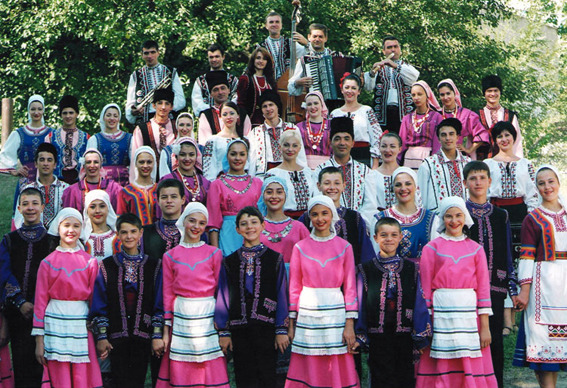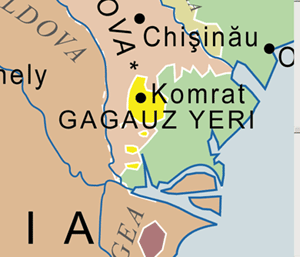Forgotten Kingdoms: The Gagauz and Identity Problems July 24, 2013
Author: Beach Combing | in : Contemporary, Modern , trackbackEastern Europe is full of unexpected populations. But few are as fun as the Gagauz, a proud and ancient people, based in what is today southern Moldova. Of course, most modern westerners have never heard of Moldova – historically part of Romania – let alone that country’s tiny minority in the south. But the Gagauz are worth getting to know if only because they have one of the coolest national anthems in the world and because they have one of the most confusing histories: they are the ultimate proof that Clio has a sense of humour. The Gagauz are… Well, there are seventeen different theories as to their origins and whatever you say you will offend someone. (In fact, if invited out to dinner in Gagauzia it is best never to ask about family lines let alone the country’s history.) If we leave out all the speculation about Turkish horsemen raiding into early medieval Europe, and Bulgar refugees and the myriad other hypotheses, two simple facts stand out out, facts that shouldn’t get you hit. First, the Gagauz are a Turkish-speaking minority on the Danube, a long century after Ottoman domination ended here. Then, second, they are Orthodox Christian. In fact, they are Turkish-speaking Orthodox Christians, not words that normally go together.
Gagauzia (long may she prosper) it today an autonomous republic in Moldova. Moldova, for those who don’t know that country’s difficult history, was a part of Romania that was prised from the Romanians in 1940 by the Soviet Union, a nation always happy to unburden its neighbours of surplus territory. Moldova broke away in 1991, as the Soviet Union came crashing down, but the Gagauz demanded autonomy because of their fears of suddenly finding themselves the preferred scapegoat of the Moldovans. Romanian-speakers – and Moldovan is essentially Romanian – have an unhappy history of mistreating their minorities. In 1991 as Moldova established itself the 26 Gaguaz towns, with a collective population of about 150,000 flirted with independence. But 150,000 people is not a lot to create a modern state and they were locked into Moldova with promises of partial independence, promises that were surprisingly kept. They are today ruled by their governor or as the Gagauz call him, their Bașkan.
There is a vocal minority of Gagauz who want independence. In fact, this very summer a petition has been drawn up demanding freedom for their still-born country; though it does not seem to enjoy anything like majority support. The Moldovans are disappointed by this behavior. And one Moldovan political scientist has replied to the petition with the following reflection: ‘The Moldovan state is fragile. We must not cause hysteria. We should focus on the dog days, vacation, the autumn harvest and avoid speculations,’ which tells you all you need to know about Moldova. No wonder that some Gagauz want to have their own dog days – what is a dog day? – and ruin their own harvests.
As to the Gagauz themselves they continue to be pulled between various regional poles. Some have accepted Moldovan or even Romanian identity: all Moldovans have right to a Romanian passport, which is very convenient because it means you can travel throughout the EU without being strip searched. Others have turned towards their linguistic homeland, Turkey. Still, others take advantage of the fact that the Bulgarian state will allow any Gagauz to become a Bulgarian citizen, because of real or imagined Bulgarian roots: a Bulgarian passport also lets you travel to Sweden and beyond, so that’s all good. Then, there are some nostalgists who play up their ties with Russia and the happy days of Stalin’s rule when the worker’s were given jobs and frequently shot for imaginary crimes. Then, there are the hard core Gagauz who consider themselves Gagauz alone. In cosmopolitan eastern Europe that sounds almost perverse, but perhaps there is something to be said for simplicity
Other historically curious and overlooked peoples: drbeachcombing AT yahoo DOT com
28 July 2013: Judith from Zenobia writes with a real gem: I’m sure you wouldn’t want to forget the 5,000 Romeyka-speakers who live near Trebezon in the Pontic region of Turkey. Though speaking a dialect said to be close to ancient Greek, they are Muslim and hence avoided the forced exchange of populations in in 1923. They are obviously a branch of the Pontic Greeks but their (sub)dialect is distinct. Now, with the Christian Pontic Greeks resettled in Greece, they are a remarkable fossil enclave in a sea of Turks. See also this Independent piece. Then there is Stephen D: As well as the Catholic Turks of Moldavia, one might mention the Muslim Tatars of Poland (there are still some, I know a girl who saw one of their mosques), the Transylvanian Germans some of whom have not left for their ancestral homelands, the Catalans of Sardinia, and the Sorbs who still form a Slavic minority in southeast Germany. The Sorbs crop up in Viktor Klemperer’s account of life as a Jew in Dresden in WWII. He and his Gentile wife were saved in the nick of time from deportation by the big bombing raid, which they survived in the surprisingly well-built Jews-only air-raid shelter (yes I know, bizarre, but there were such things), walked out of the burning city discarding his overcoat with the yellow star, claimed when they reached a refugee centre that his coat had caught fire, he had thrown it away and run, remembering too late that all his papers were in it; got replacement papers, and went to (here I come to the point) a Sorbian village to which a maid who had worked for them in Dresden had returned. She sheltered them, and they were accepted by the local Sorbs as being her friends; Klemperer says the villagers talked openly in Sorbian about the impending and greatly wished-for collapse of the Nazi state, confident that no German would understand. Not to mention the minority populations who have now merged with the majority: the Iranian-speaking Iazyges and the Turkic Cumanians who survived in Hungary as distinct groups till the seventeenth century, the Iranian Alans who settled in Britanny, the Irish kingdoms of South Wales, the Saracens of Lucera … Thanks Judith and Stephen!




